myHIN Blog
Category: Voices Articles

January 29, 2014
My 2014 Anthem
Whenever a new year comes around, people create new years resolutions. This idea may seem good but it’s important that you stay committed to your goals you’ve set. I heard a quote once that said, “Old ways won’t open new doors”. This quote has truly resonated in my spirit, thus the song that represents the year 2014 for me is New Season by Israel and New Breed. This year I am determined to work towards fulfilling my PURPOSE for being here on this earth. Yes, to find that one thing that I am passionate about- my heart’s desire. With graduation quickly approaching at the end of this semester, I will be entering another new season called “the real world”. The thought can be quite frightening and exciting at the same time. One songwriter said, “Time is filled with swift transition”. I have found this to be true. I’m determined to keep moving forward with the mindset that there’s nothing I can’t do. If I can conceptualize it, certainly it can be done. It may take time but that’s when my faith kicks in. It’s a new season and I’m ready for it!
Share

December 05, 2013
The Road to the Red Pump
This month makes six months that I’ve been onboard the myHealthImpact team. Thus far, it has been a very enjoyable experience and it truly feels like a family. MyHealthImpact will be attending the Red Pump Project. This project raises awareness regarding HIV/AIDS and its impact on females. Red Pump’s mission is to “promote HIV prevention through education, and open dialogue about the issues that surround sexual and reproductive health”.
While the color red is associated with energy, confidence, action and vitality, this aligns with The Red Pumps concept of empowerment for women. 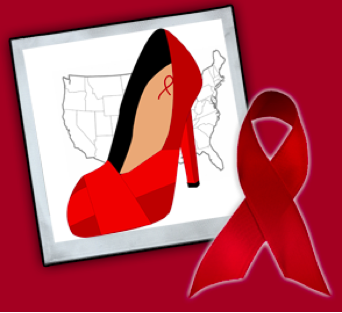 On the road to Red Pump, the myHealthImpact team will document our journey and experiences. With the mixture of personalities that are currently on the team, I know that we are bound to have a memorable time. Our team will be actively involved in the Red Pump event, so be on the look out for our videos, tweets, pics and blogs. Though this event is geared around women, the HIV/AIDS epidemic has affected both genders tremendously. As a male. I do believe that I will be able to benefit from attending this event on behalf of myHealthImpact. Increasing your knowledge base is always a positive aspect to one’s role in developing as an individual.
On the road to Red Pump, the myHealthImpact team will document our journey and experiences. With the mixture of personalities that are currently on the team, I know that we are bound to have a memorable time. Our team will be actively involved in the Red Pump event, so be on the look out for our videos, tweets, pics and blogs. Though this event is geared around women, the HIV/AIDS epidemic has affected both genders tremendously. As a male. I do believe that I will be able to benefit from attending this event on behalf of myHealthImpact. Increasing your knowledge base is always a positive aspect to one’s role in developing as an individual.
Spreading the information to others not only help those who don’t know but can potentially save lives. Preparation for this event ties into this month’s 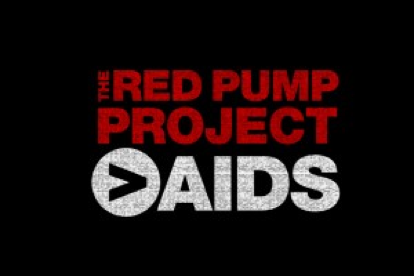 focus, which is HIV Awareness and World AIDS Day (December 1). The spreading of diseases can be prevented, and more events can be hosted to inform the community of the disease. This event is going to be amazing, and I’m looking forward to it. Be on the lookout for the video footage and other information pertaining to myHealthImpact’s involvement with the Red Pump Project.
focus, which is HIV Awareness and World AIDS Day (December 1). The spreading of diseases can be prevented, and more events can be hosted to inform the community of the disease. This event is going to be amazing, and I’m looking forward to it. Be on the lookout for the video footage and other information pertaining to myHealthImpact’s involvement with the Red Pump Project.
Share

November 25, 2013
Black Community
Just listen to these lyrics… These songs not only disrespect women and even men, they put the African American community to shame. Some of the lyrics in these songs refer to women as “property” and “treating women like dogs”. I don’t understand how people can stand to listen to these lyrics. After a while, what you listen to will eventually get down inside of you and it becomes a part of you. People can’t expect others to respect them when they willingly jam in the car to music such as this. Yea, the beat may be “attractive” but are people really listening to the words that these artists are saying. It’s totally unacceptable.
This month, the focus is Sexual Health for myHealthImpact. Though these songs degrade both men and women, they also have sexual references as well. It’s important that each person takes responsibility for their health, body and the decision of having sex at a certain age. Songs such as those listed above make it seem as if having sex early is cool, but there are consequences for every action. Being knowledgeable about sex and its repercussions is very important for your health. Take some time and learn about the topic before you immediately enter into something that you have no idea about. This could save your life. Think about it.
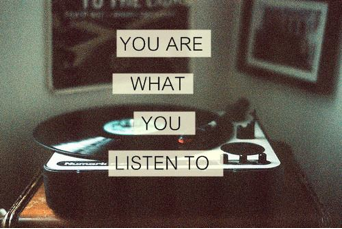
Share

October 13, 2013
Joint Blog with a Friend
My very good friend Julian and I, went to an on-campus HIV/STD free testing event (9/27/13). Upon walking into the room, we both just knew it would have been a packed room of individuals curious of their status. Boy, were we wrong. We could literally count on just two hands how many people were in there just during the time span we were there, which was almost an hour. I can only speak for myself but I was completely disappointed in the turn out. Why the stigma with getting HIV tested? Why weren’t a huge number of individuals there?
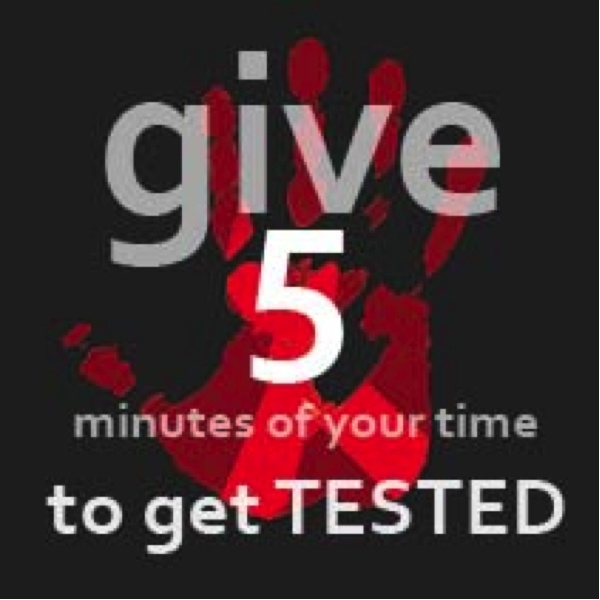
Granted, I have no idea how well this event was advertised but in the event that some entity is offering FREE testing, I just feel as though people should come out in numbers. I don’t know about you but I choose free over $60+ any day. Ok but back to my question, why the stigma? Julian and I discussed going to get tested prior to actually going and for some reason hesitated in doing so. I will be the first to admit, that at first, I was really scared. Scared to know. Scared to have to deal with. I honestly and truly believe that along with the previous listed, people just don’t want to be seen getting tested, but why not??? Please be reminded that this is just my opinion, but I respect an individual for knowing their status versus playing Russian roulette with not only their life and health but with others as well.
By: Julian Cobb
It still blows my mind that people would pass up an opportunity to get tested for FREE. This generation can stay in tune with the latest music or even spend time scrolling down their Instagram timeline but can’t take a few minutes to partake in something that can dramatically impact their lives. I understand that people may feel intimidated or just scared of not going because they fear what the results might say. I was always taught that fear is nothing but false- evidence- appearing- real. Going to get tested with a friend, just like I did with Keiara, is a good way to ease that anxiety. It is better to know for yourself than to keep wondering “what if”. Too often people are concerned about what others think of them. Quite frankly, knowing that you got tested might encourage someone else to do the same. Never underestimate the power that resides within you because I guarantee that somebody is watching. The question is what do you want them to see? You taking the initiative to get tested or being passive because of fear? Fear is only what you make it. You have control over your thoughts so choose to be positive and know your status.
Ever since we went to get tested, we’ve truly been playing the waiting game but it has been on my heart and mind that people really hate to talk about HIV/STDs, really don’t want to get tested out of sheer fear. We encourage and challenge you to get tested, know your status, and then encourage others to do the same. I’m very glad that I…we went to get tested. We’re friends. We hold each other accountable.
Share

October 06, 2013
Think before you say, act, and do!
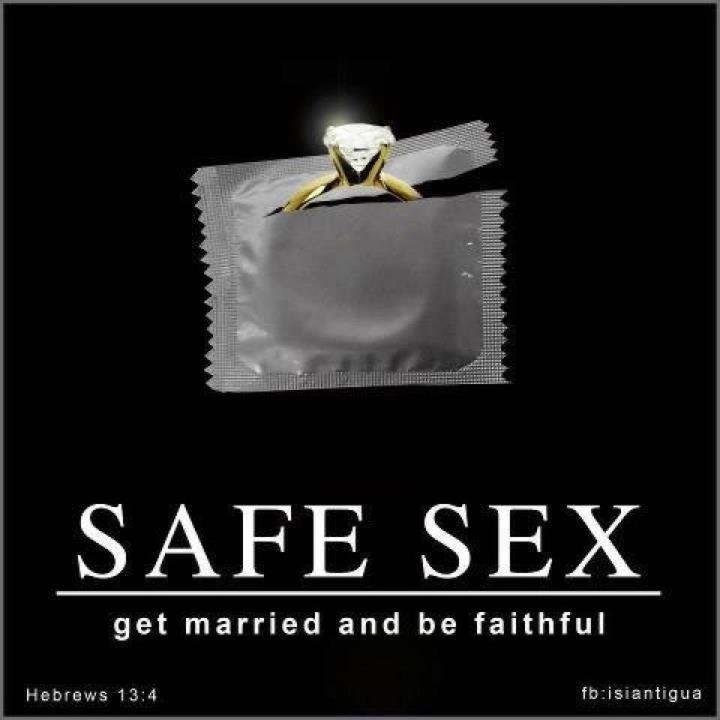
I recently attended a program on my campus, which focused on discussing various “hot topics” that affect college students. The topics discussed including: Sex, Relationships, Voting, Religion, and Social Media.
What age is it appropriate to start having sex?
Though many of the topics discussed were interesting, one particular topic stood out to me—What age is it appropriate to start having sex? At first I was appalled. I never knew there was an appropriate age for sex. And if there was, what made that age, the right age?
The answers included: 13, before you go to college, when you’re married, and when you are ready to deal with the consequences.
As I sat in my seat, I began to listen to what others had to say. The answers included: 13, before you go to college, when you’re married, and when you are ready to deal with the consequences. For a moment, I felt embarrassed and hurt that peers thought this was an acceptable topic to discuss. I couldn’t believe what I was hearing.
Whether I agreed with some of the answers or not, I didn’t want to participate in a discussion that could potentially affect how another individual could make a decision when it comes to sex. Don’t get me wrong, I believe in educating my community about safe sex, but I think it’s important for people to know how much influence they could have on a person.
Whether or not I had an opinion on the topic, I made sure to keep it to myself. I didn’t want my opinion to influence someone else to make an irrational decision about sex. With that said, I think people should realize that we live in a society that most learn by example. And by that topic being discussed, we are saying its okay to assign sex to an age. And if you see nothing wrong with that, than maybe we as people need to evaluate ourselves. From this one experience I learned a valuable lesson: Think before you say, act, and do!
Follow us at tumblr.myhealthimpactnetwork.org (Tumblr)
Follow us on Twitter @myhealthimpact
Share

August 18, 2013
Black Women’s Love Affair with Hair
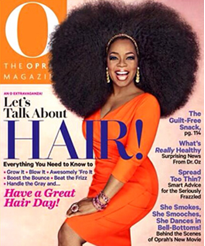
Black women’s hair is a miraculous thing! Naturalistas sporting fabulous afros, twists, plats, braids, and locs. Bold sistahs rocking close-cut fades and TWAs. Sophisticated ladies wearing sleek perms, extensions, and weaves. Long or short, kinky or straight, black hair don’t care. To keep our diverse hairstyles tight, Black women spent nearly half a trillion dollars on hair care in 2011! Oprah Winfrey rocks a fierce, 3lb afro wig on the cover of her August 2013 magazine’s issue on hair.
This is part of a long tradition of Black women’s love affair with their hair. In the early 1900’s, Sara Breedlove, popularly known as Madam C.J. Walker, became the first female self-made millionaire in America. She amassed her fortune inventing wildly popular African American hair care and cosmetic products. Her company also trained sales beauticians known as “Walker Agents” who went out into Black communities and promoted Walker’s philosophy of “cleanliness and loveliness”.
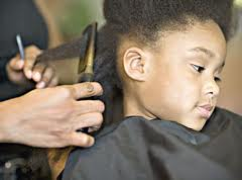
Today, changing hair is simply a fashion statement for some Black women. Just like changing clothes, we can wear a curly fro on Monday and slick our hair back into a bun on Tuesday. This styling versatility is a hallmark of black women’s beauty, and learning how to care for our hair is an important cultural practice. Many of us have fond (and not so fond) memories of having our hair wash, detangled, braided, pressed, and otherwise cared for by our mothers, aunties, grandmas and girl friends. Hair straightening was a rite of passage for most Black women. While younger women know all about the flat iron, those of us from the old school will recall getting our hair straightened (and ears singed) with lots of grease and a sizzling hot comb in the kitchen. Yet, we all remember those trips to the beauty salon where we listened in amazement as to the grown folks talked while we got our hair done.
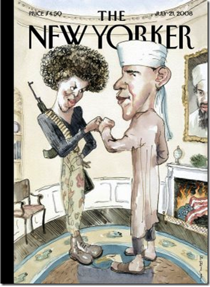 Black women may also style their hair for purely functional purposes. Perhaps we splurge and get long silky extensions for a formal affair like our sister’s wedding. Or in the summer time, we may wear hassle-free microbraids for a vacation at the beach. When we are short on time or have to meet the demands of work or school, perhaps we go in for “the big chop” or loc our hair to achieve an easier to maintain style that reduces or even eliminates trips in the beauty salon. With the growing natural hair movement, some black women are asking if we are seeing the end of the Black beauty salon culture.
Black women may also style their hair for purely functional purposes. Perhaps we splurge and get long silky extensions for a formal affair like our sister’s wedding. Or in the summer time, we may wear hassle-free microbraids for a vacation at the beach. When we are short on time or have to meet the demands of work or school, perhaps we go in for “the big chop” or loc our hair to achieve an easier to maintain style that reduces or even eliminates trips in the beauty salon. With the growing natural hair movement, some black women are asking if we are seeing the end of the Black beauty salon culture.
Sometime we style our hair in its natural state as self-affirming statement of racial and cultural pride, for ease of maintenance, or as a healthy choice. However, even as more women choose to where their hair naturally, it is still largely seen as socially unacceptable.
Even the FLOTUS can’t escape public scrutiny of her hair choices. One of my favorite online comment: "Girl, ain't no braids, twists, afros, etc. getting into the White House just yet ... LOL." Ya’ll remember the New Yorker cover that depicted Michelle with an afro and a rifle? When a naturallycurly.com web poll asked if the U.S. was ready for a first lady with natural kinky hair, 56% of respondents said “no”. Indeed, Michelle Obama’s hair carries a lot of cultural baggage.
So here we are in 2013 and Black women’s hair remains politicized! Sistahs on the job market still wonder aloud if the texture or style of their natural hair will prevent them from being hired. Only women with long silky hair need apply? Sistahs are also being told by Glamour magazine that “political” hairstyles like locs and afros are considered inappropriate in some places of work. Rhonda Lee, a Black female meteorologist, was fired from her job on a Louisiana TV station after publicly defending her ethnic hair. Black women, including Solange Knowles, have had TSA security guards demand to search their natural hair before boarding the plane. (I’ve also had my own “flying while naturally Black” experience when I had my locs in an up-do while boarding an airplane). Incidents such as these inspired MSNBC correspondent Melissa Harris-Perry devoted a 3-minute “teachable moment” segment and panel discussions on the politics of Black hair.
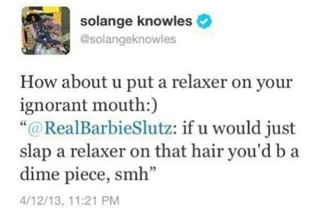 When Black women choose to maintain their hair naturally, they get cultural pushback. Strangers will literally come up to you and ask, “Can I touch your hair?” Sometimes they will even disregard your personhood and just touch your hair. People will also criticize you for having “nappy hair” and feel like they have the right to tell you to change your look. Just ask Solange Knowles, who had to call out this nonsense in a Twitter exchange. People with no couth may even ask if your hair is real if you have grown long hair because they are accustomed to the notion that Black women wear weaves and fake hair pieces.
When Black women choose to maintain their hair naturally, they get cultural pushback. Strangers will literally come up to you and ask, “Can I touch your hair?” Sometimes they will even disregard your personhood and just touch your hair. People will also criticize you for having “nappy hair” and feel like they have the right to tell you to change your look. Just ask Solange Knowles, who had to call out this nonsense in a Twitter exchange. People with no couth may even ask if your hair is real if you have grown long hair because they are accustomed to the notion that Black women wear weaves and fake hair pieces.
Black women with chemically relaxed and straightened hair also experience cultural abuse. They are criticized for trying to “look white”, taking the easy road, or conforming to a white aesthetic. Chris Rock and HBO films produced the documentary "Good Hair” in 2006 to explore why Black women hold straight long hair as the prevailing beauty ideal. Four years later, Tyra Banks makes national news when she announces on Twitter that she is going weaveless during the next season of America’s Next Top Model. Permed hair and weaves are waning in popularity as a growing number of Black women transition to natural hair styles.
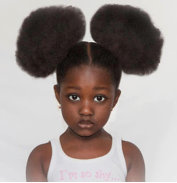 These types of cultural push back take a toll on all of us. Hair does not mean the same thing to white women as it does to Black women. For us, the cultural weight and social value of straight hair is very strong. Mental health experts routinely counsel Black women on hair issues that negatively impact self-esteem and body image. Black women can find strength and support by engaging with one of the many online communities devoted to Black women’s hair. Madam Noire offers a list of hair blogs for natural sistahs who need support. Also be sure to read through the comments for additional recommendations. Check out Tumblr and Pinterest as sources for inspirational images and videos. A simple search on YouTube will get you connected to “how to” videos on twist outs, transitioning from relaxed to natural hair, Marley braids, wash-n-go styles, bantu knots, straightening hair without heat, and a many other styling techniques. You can also direct your culturally uninformed coworkers and friends to CNN’s natural black hair etiquette guide on its website.
These types of cultural push back take a toll on all of us. Hair does not mean the same thing to white women as it does to Black women. For us, the cultural weight and social value of straight hair is very strong. Mental health experts routinely counsel Black women on hair issues that negatively impact self-esteem and body image. Black women can find strength and support by engaging with one of the many online communities devoted to Black women’s hair. Madam Noire offers a list of hair blogs for natural sistahs who need support. Also be sure to read through the comments for additional recommendations. Check out Tumblr and Pinterest as sources for inspirational images and videos. A simple search on YouTube will get you connected to “how to” videos on twist outs, transitioning from relaxed to natural hair, Marley braids, wash-n-go styles, bantu knots, straightening hair without heat, and a many other styling techniques. You can also direct your culturally uninformed coworkers and friends to CNN’s natural black hair etiquette guide on its website.
Sadly, our baby girls also face these hair and self-esteem issues. Just this year, for instance, there was an incident where a school in Ohio attempted to ban afro puffs and small twisted braids. If you’re in need of support, Sesame Street produced a much talked about song, “I love my hair”, to help young Black girls feel positive about their hair. And Amazon.com has a list of Black children’s hair books available for purchase. There are also blogs, YouTube channels and other websites devoted to caring for Black girl’s hair.
Whether you’re curly, kinky, loc’d, or straight, it’s all good hair sistahs!
Follow us at tumblr.myhealthimpactnetwork.org (Tumblr)
Follow us on Twitter @myhealthimpact
Share

May 06, 2013
The Evolution of a Sneakerhead
As the days dwindle away and graduation finds its way closer, a lot of thoughts have been running through my head. Thoughts primarily centered on my college experiences and how those moments have shaped me into the person I am today. Being a part of the myHealthImpact project has meant a lot to me, from gaining tangible skillsets to traveling across the country to promote our efforts. Although my obsession for simplicity and design drove my involvement with myHealthImpact, it was this representation of realizing a problem and attacking it head on with a unique solution that initiated my thoughts with respect to footwear.
As a child I was always fascinated with various types of sneakers. I wasn’t interested in wearing ‘regular’ or ‘basic’ shoes. I was more content with the latest and greatest Nikes, Jordan’s, and yes even Fila’s! I would beg my mom until she gave in and purchased my favorite pair of sneaks; but for some reason I was never completely satisfied. As the most expensive shoes felt uncomfortable and irritated me when I walked. This was evident because I had already been diagnosed with femoral antersion, or walking pigeon-toed, a common childhood orthopedic condition.
For a short time, I also wore shoes with braces, which I despised. While in middle school, I faced additional foot problems that made it difficult for my feet to stay on the foot bed of most sneakers. As a freshman at NCSU the foot problems ensued and further measures were taken such as creating a mold that I would wear in my shoes to provide comfort as I walked around campus. Currently, I have to engage in daily rituals by performing various foot exercises to ease the pains I may encounter during the day. Needless to say I have endured enough.
Despite my constant foot problems, for those who know me, I have been a lover of sneakers from the beginning of time. My devout following to rocking the latest kicks really took off when I entered college and met a small group of individuals who also shared this same passion. After accumulating dozens of shoes and even hosting the first ever sneaker showcase titled "Sneaks and Beat's' back in 2010, I still felt the need to do more. Now that I have officially hanged up my sneaks and done a lot of reflection, I have been toying with the idea of ending my retirement and refocusing my career on designing athletic footwear in conjunction with the medical field for optimal foot health.
Post graduation, I hope to take my experiences and turn it into a career filled with passion while helping others along the way. Thus, my involvement as an Undergraduate Researcher for this project has tremendously influenced me to pursue @myHealthImpact.
Follow us at tumblr.myhealthimpactnetwork.org (Tumblr)
Follow us on Twitter @myhealthimpact
Share

April 29, 2013
Response to Dr. Payton’s Blog Entitled “Sound Your Voices”
Jackson State University
Advisor: Dr. Lawrence T. Potter, Jr., Dean of the College of Liberal Arts
Why is it important for young black women to discuss the issue of HIV?
HIV should be an issue discussed among black women and the entire black community. The stats among black women are increasing at alarming rates. According to the C.D.C., most of the new cases that arise come from black women involved in heterosexual relationships. In addition, black women are still showing rates that are higher than any other race. Black women should become more vocal about not engaging in unprotected sexual relationships.
Furthermore, black women need to become adult advocates to educate each other about HIV and to become aware of the increased risk associated with the virus. However, black women must educate themselves first. Black women have to stop playing the victim role and start rising above the stats. Black women must stand as a united defense about the spread of HIV. Some ways that can help black women to become more vocal is increasing their knowledge about the virus, taking an initiative to protect yourself and others through getting tested, and sharing the information about HIV with friends and partners.
See myhealthimpactnetwork.org on the Web for other blogs, videos, newsletter signup and the newly released Android mobile app. Follow Dr. Payton and the research team @myhealthimpact on Twitter.
Follow us at tumblr.myhealthimpactnetwork.org (Tumblr)
Follow us on Twitter @myhealthimpact
Share

April 15, 2013
Women’s Empowerment 2013
Last month, the PNC Arena experienced something that only happens once a year. By 11am, over 8,000 women, of all ages and races, filled the arena and were eager to be empowered! The spirit was overwhelming.
The first person to empower me was Bishop T.D. Jakes. The title of his sermon was “Lord, don’t give me anything I can’t handle”. Here are a few notes that I took:
- God is not fair
- If I couldn't handle it, He wouldn't have given it to me!
- Fear will shut down your instincts and steal your time
- Success is intentional!
The last point stuck out to me the most. Success becomes intentional the minute you set a goal to do something. If all goes well, you will make it to a place called success and look back at your goals ready to check one off of the list. Don’t think that you are just “lucky”. Everything happens for a reason!
After this very inspirational word, I decided to get to work for myHIN! Jeremy and I went around to the vendor’s area and began passing out our business cards and telling people about our project. As I walked around, I noticed that there was a booth set up specifically for HIV/AIDS and they had information and stickers from the Greater Than AIDS movement to pass out! I was very pleased to see this booth amongst the people selling clothes, jewelry, and artwork. It was a perfect location to spread the message.
It was great to be amongst so many women who came together for one goal: to be empowered! I can really say that after the Black Men Revealed Panel, Wendy Williams, and Erykah Badu’s performance, I left PNC Arena better than I came! I was very excited that once again, I was able to combine my love for music with my interest of helping put an end to HIV/AIDS.
Below is a picture that sums up my day at the event!
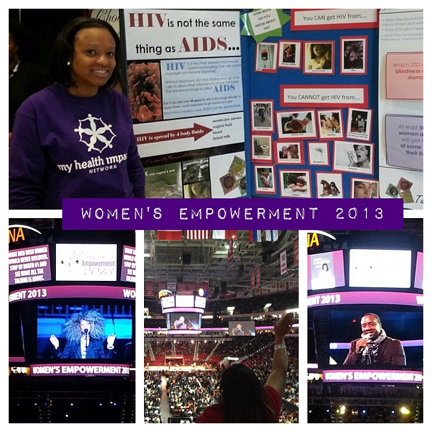
Follow us at tumblr.myhealthimpactnetwork.org (Tumblr)
Follow us on Twitter @myhealthimpact
Share

April 10, 2013
The Problem with Black Women’s Health
Dominant. Independent. Bitter. Empowered. Manipulative. “I can do bad all by myself”. Superwomen. Stubborn. In denial. Ladies, what do these characteristics describe? These words or phrases are often used to label African American women. Whether we categorize these features under positive or negative connotations, there is unfortunately some truth behind every single one of them. African American women are hard- working, dedicated, educated professionals but we tend to put everyone and everything before ourselves. We want the best for our families and friends, which tends to become our overall mission of life, and forget about our own personal image and health. In many cases, African American women are single parents or just self- reliant individuals who metaphorically develop stern, powerful mindsets as their defense from real and perceived attacks. We go hard on ourselves since we automatically fall within the lower rank in American society; being classified as “double wammies” since we are female AND of the racial minority.
The number one health-related issue that black women deal with is cardiovascular disease. According to the National Stroke Association, one half of all African American women will die from stroke or heart disease. The death rates from heart disease and strokes for African American females are double those of White and Hispanic females. Our culture also tends to continuously struggle with health problems associated with obesity and high blood pressure. From overworking ourselves and fighting sleep, to insisting that we are in good health (bitterness), all of these cultural aspects play a role in our refusal of medical assistance when we need it most.
“Too many of us are just as crazy, walking (or running) around in denial, ignoring signs (headaches, exhaustion, dizziness, vision changes, weakness, numbness) that should send us to the doctor, not to the office or the car pool or off on that next ‘all important’ business trip. We are in denial about the real impact of our obesity, our smoking, drinking, and lack of exercise…all women should remember that whatever power we each possess is rooted first and foremost in our health. We work so hard to control so much and we’re always up for a challenge. Fine! Here’s a challenge! Commit to spending more time and attention controlling—and caring for—yourself.” (Caroline Clarke, Black Enterprise: Wealth for Life)
Share
Page 7 of 8 pages ‹ First < 5 6 7 8 >
In Partnership with: Poole College of Management, College of Humanities and Social Sciences, National Science Foundation, Penn State
Take Action, Get Tested: Find Your Local Testing Center Why Get Tested?
